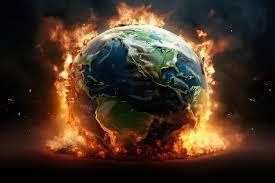Global warming is one of the most pressing challenges of our time, impacting not just the environment but also our societies, economies, and health. As temperatures rise and weather patterns shift, the urgency to address this issue becomes clearer. But what exactly is global warming, and why should we be concerned?
What is Global Warming?
Global warming refers to the long-term increase in Earth’s average temperature, primarily due to the buildup of greenhouse gases like carbon dioxide (CO2) in the atmosphere. These gases trap heat from the sun, creating a “greenhouse effect” that warms the planet. While some greenhouse gases occur naturally, human activities such as burning fossil fuels (coal, oil, and gas), deforestation, and industrial processes have significantly increased their concentrations, amplifying the natural effect and leading to accelerated warming.
The Visible Impacts
The signs of global warming are already visible. Here are some key ways it’s affecting our planet:
-
Melting Polar Ice Caps: The Arctic and Antarctic regions are experiencing dramatic ice loss. As the ice melts, sea levels rise, threatening coastal cities and communities worldwide.
-
Rising Sea Levels: Since 1880, the average global sea level has risen by about 8-9 inches (21-24 cm), with approximately a third of that increase occurring in the last two and a half decades. This puts millions of people at risk of displacement due to flooding.
-
Extreme Weather Events: Heatwaves, hurricanes, droughts, and floods are becoming more frequent and intense. These events devastate homes, disrupt economies, and cause significant loss of life.
-
Loss of Biodiversity: Warmer temperatures and changing ecosystems are forcing many species into extinction. Coral reefs, which support a vast range of marine life, are particularly vulnerable, with significant portions already dying due to coral bleaching.
Why Should You Care?
-
Health Risks: Rising temperatures contribute to an increase in heat-related illnesses, respiratory problems from air pollution, and the spread of diseases like malaria and dengue fever.
-
Economic Costs: The financial impacts of global warming are vast. Flood damage, crop failures, and the costs of rebuilding after natural disasters can burden economies, especially in developing nations that are less equipped to handle these challenges.
-
Food and Water Scarcity: Climate change is altering weather patterns, impacting food production and freshwater availability. This could lead to shortages, higher prices, and increased food insecurity around the world.
What Can Be Done?
Tackling global warming requires a collective effort from governments, businesses, and individuals alike. Here are some key strategies:
-
Transition to Renewable Energy: Shifting from fossil fuels to renewable energy sources such as wind, solar, and hydropower can significantly reduce greenhouse gas emissions.
-
Reforestation and Conservation: Planting trees and protecting natural habitats help absorb CO2 from the atmosphere, reducing the overall carbon footprint.
-
Sustainable Practices: From reducing waste to adopting energy-efficient technologies, every small action contributes to the larger goal of combating climate change.
-
Policy Changes: Governments must implement and enforce climate-friendly policies. This includes international agreements like the Paris Agreement, which aims to limit global temperature rise to below 2°C above pre-industrial levels.
The Power of Awareness
One of the most important things we can do is to stay informed and raise awareness. Share information, advocate for change, and encourage sustainable practices in your community. The more people understand the science and impacts of global warming, the stronger the push for action will become.
Conclusion
Global warming is not just an environmental issue; it’s a humanitarian crisis. By understanding its causes and effects, and by taking meaningful steps to reduce our impact, we can slow the pace of climate change and protect the planet for future generations. The time to act is now—our planet’s future depends on it.

